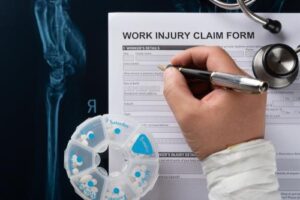
Workers’ compensation claims for cancer may be available if your diagnosis is linked to harmful conditions or substances at your workplace. If you were exposed to carcinogens or dangerous chemicals on the job, you might be entitled to benefits that cover your medical expenses, lost wages, and other costs related to your illness.
It’s important to act quickly, as workers’ compensation claims for occupational cancers often require evidence showing how your job contributed to your diagnosis. An Atlanta workers’ compensation lawyer can help you understand the process and your rights so you get the benefits you need for your treatment and recovery.
What Types of Cancer Qualify for Workers’ Compensation?
Certain types of cancer may qualify for workers’ compensation if they are linked to workplace exposure to harmful substances. Some cancers commonly associated with work-related exposure include lung cancer, skin cancer, mesothelioma, bladder cancer, and leukemia.
The eligibility for workers’ compensation largely depends on the type of carcinogens or toxins you were exposed to on the job. For instance:
- Lung cancer may develop due to exposure to asbestos, silica dust, or industrial chemicals.
- Skin cancer could result from prolonged exposure to harmful ultraviolet (UV) rays or toxic substances.
- Mesothelioma is often directly linked to asbestos exposure, commonly found in construction or manufacturing industries.
- Bladder cancer may occur from contact with certain dyes, solvents, and chemicals used in industries like rubber or leather manufacturing.
- Leukemia is sometimes related to exposure to benzene, a chemical used in oil, manufacturing, and other industries.
If you were exposed to carcinogens or dangerous chemicals at work that led to your cancer diagnosis, you may be entitled to workers’ compensation benefits. Consulting with an Atlanta mesothelioma and asbestos cancer lawyer can help you understand your rights and the potential for filing a claim.
Get the strong arm
How Can You Prove Your Cancer Is Work-Related?
Understanding workers’ compensation claims for cancer requires proving that your diagnosis is directly related to your work conditions. To successfully connect your diagnosis to your workplace, you’ll need to provide strong evidence.
Medical Documentation
A crucial part of proving your claim is obtaining thorough medical documentation. This includes your diagnosis, treatment plans, and any notes from your doctor linking your cancer to specific workplace exposures. Medical records showing when your symptoms began and how they correlate with your work environment are vital.
Workplace Exposure Evidence
You will also need evidence of the toxic substances or carcinogens present in your workplace. This can include company records, safety reports, or even photographs showing hazardous conditions. Witness statements from co-workers who experienced similar exposures or illnesses can help corroborate your claim.
Expert Testimony
In many cases, expert testimony is required to support your claim. Medical professionals, occupational health experts, or environmental specialists can offer critical insights into how the exposures at your workplace contributed to your cancer. Their analysis can help establish a clear connection between your work environment and your diagnosis.
Collecting all these forms of evidence is essential to building a strong workers’ compensation claim that ties your cancer diagnosis directly to your work environment. If you’re unsure about your eligibility, understanding how to tell if you’re eligible for workers’ compensation can help you take the right steps toward receiving the benefits you deserve.
What Benefits Can You Receive From a Workers’ Compensation Claim for Cancer?
If your cancer is work-related, you may be eligible for several workers’ compensation benefits. These benefits are designed to support you financially while you undergo treatment and recover. Understanding the different types of benefits available can help you maximize the support you receive during this difficult time.
- Medical expenses: Workers’ compensation generally covers medical costs, including doctor visits, chemotherapy, surgeries, hospital stays, and medication needed to treat your cancer.
- Wage replacement: If your cancer prevents you from working, you may receive wage replacement. Temporary disability benefits provide partial wage compensation during your recovery, while permanent disability benefits are available if you experience long-term impairment.
- Vocational rehabilitation: If your cancer restricts you from returning to your previous role, vocational rehabilitation agency benefits may help. These can include retraining, education, or job placement services to assist you in transitioning to a new position.
Receiving these benefits can ease the financial burden caused by a work-related cancer diagnosis and ensure you are supported during your recovery. It is important to understand all options available to you so you can focus on healing without the stress of financial uncertainty.
How Can a Lawyer Help With a Workers’ Compensation Claim for Cancer?
A lawyer can provide crucial support when filing a workers’ compensation claim for cancer by guiding you through the process and ensuring all paperwork is accurate and timely. They can also help gather the necessary evidence to build a strong case.
Some ways a lawyer can help include:
- Filing your claim
- Gathering medical evidence
- Negotiating with insurers
- Representing you in disputes
Legal representation gives you the best chance of maximizing your benefits and securing the financial support you need. An attorney’s assistance allows you to focus on your treatment and recovery while they handle the complexities of your claim.
Get the Help You Need for Your Workers’ Compensation Claim
If you have been diagnosed with work-related cancer, getting the right legal support is essential for securing your benefits. At John Foy & Associates, we have recovered over $1 billion for our clients. Our no-fee until-you-win policy means you can focus on your health while we fight for your financial recovery.
Don’t wait to get the help you need. Contact us today to discuss your case and take the first step toward securing the benefits necessary for your treatment and future. We are ready to help you understand your rights and pursue the compensation you deserve.
404-400-4000 or complete a Free Case Evaluation form





